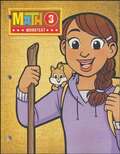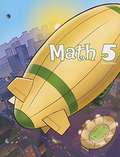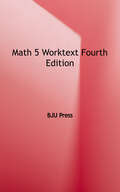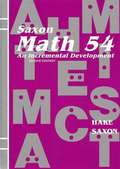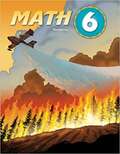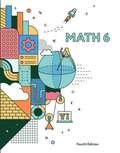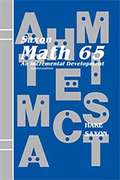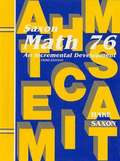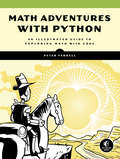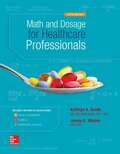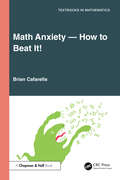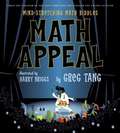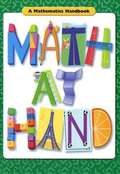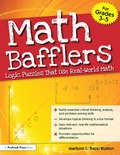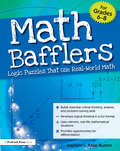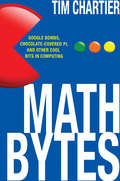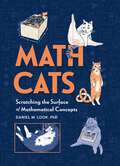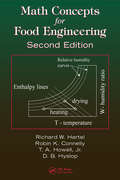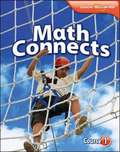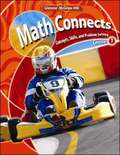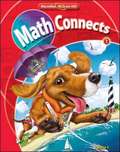- Table View
- List View
Math 3 Worktext
by Bju PressMath 3 (4th Edition) Student Worktext is a consumable resource that solidifies knowledge by encouraging students to picture and explain answers with written responses. Students will develop a competency in working with place values, multiplication, division, and fractions. The adventures of Hailey and Horatio encourage learning and reinforce biblical worldview teaching, while Serve with Math pages create a touchpoint for math application. Teaching place value, multiplication, division, and fractions, this 4th edition is built on biblical themes showing math’s design and limitations, and how math is used in work and in helping people. The Home School Kit includes the consumable Student worktext, teacher’s edition, student reviews and answer key, paper manipulatives packet, tests and answer key.
Math 5 Student Worktext
by Dennae White Gina Bradstreet Renee L. Cancino Kathy Hynicka Tammie Jacobs Sandra Kauffman Charlene McCallWelcome to Math 5 Develop your skills and explore new ideas as you travel through Math 5. Each chapter begins with a story about historical aspects of aviation that connects flight with mathematical concepts. Activities such as using math manipulatives, acting out math problems, and making graphs engage the students in active learning. Learn to appreciate the wisdom and greatness of our Creator you see the order, pattern and design in creation as you study math.
Math 5 Worktext
by Bju PressThe Student Worktext reinforces lesson content with a two-page spiral review format. Daily review opportunities encourage mastery while chapter opening articles and word problems emphasize biblical worldview shaping themes. <p><p>The worktext also includes eight two-page STEM lessons with corresponding activities. The problem-solving handbook offers additional review for math foundations and a problem-solving plan.
Math 54: An Incremental Development
by Stephen Hake John SaxonWe study mathematics because it is an important part of our daily lives. Our school schedule, our trip to the store, the preparation of our meals, and many of the games we play all involve mathematics. Most of the word problems you will see in this book are drawn from our daily experiences.
Math 6
by Bju PressMath 6 Student Text, 3rd edition, will help students through the transition between elementary and secondary math, reviewing previously taught concepts and introducing new ones. <p><p>A handbook section contains a glossary of terms and definitions along with illustration of math concepts for student reference, and a daily review section provides exercises for the reviewing of previously taught concepts. <p><p>Grade 6 continues to develop understanding of multiplication and division of fractions, proportions, percents, statistics, ratios, measurement and geometry along with further development of problem-solving and estimation skills. It includes a pre-algebra chapter introducing multiplication and division of integers using manipulatives and real-life pre-algebra word problems.
Math 6 Student
by Bju PressThe 6th grade math textbook provides practice and direct application for all math concepts students will learn. Students will use what they have learned in lessons from the Math 6 teacher’s edition to think critically about how to use math and how to reason with math. Students will find STEM lessons that follow the engineering design process as well as a variety of engaging illustrations and pictures that help them better understand how to use math to solve real-world problems.
Math 65 An Incremental Development, Second Edition
by Stephen Hake John SaxonMath textbook for middle school
Math 76: An Incremental Development (3rd Edition)
by Stephen Hake John SaxonThe book contains daily lessons and investigations. Each lesson begins with practice of basic number facts and mental math that will improve speed, accuracy, and ability of students to do math. The pattern and problem-solving activities give practice using strategies that help solve more complicated problems. Practice problems focus on the topic of each lesson. Following each lesson is a problem set that reviews the day-to-day learning skills. Investigations are variations of the daily lesson.
Math Adventures with Python: An Illustrated Guide to Exploring Math with Code
by Peter FarrellLearn math by getting creative with code! Use the Python programming language to transform learning high school-level math topics like algebra, geometry, trigonometry, and calculus!Math Adventures with Python will show you how to harness the power of programming to keep math relevant and fun. With the aid of the Python programming language, you'll learn how to visualize solutions to a range of math problems as you use code to explore key mathematical concepts like algebra, trigonometry, matrices, and cellular automata.Once you've learned the programming basics like loops and variables, you'll write your own programs to solve equations quickly, make cool things like an interactive rainbow grid, and automate tedious tasks like factoring numbers and finding square roots. You'll learn how to write functions to draw and manipulate shapes, create oscillating sine waves, and solve equations graphically. You'll also learn how to: - Draw and transform 2D and 3D graphics with matrices- Make colorful designs like the Mandelbrot and Julia sets with complex numbers- Use recursion to create fractals like the Koch snowflake and the Sierpinski triangle- Generate virtual sheep that graze on grass and multiply autonomously - Crack secret codes using genetic algorithms As you work through the book's numerous examples and increasingly challenging exercises, you'll code your own solutions, create beautiful visualizations, and see just how much more fun math can be!
Math And Dosage Calculations For Healthcare Professionals
by Kathryn A. Booth James WhaleyMath and Dosage Calculations for Healthcare Professionals ( M&DC) introduces students to the concepts and skills they will need to move forward within their chosen health profession or nursing curriculum. Students will need dynamic tools and multiple resources to ensure success and this product provides everything they need!
Math Anxiety—How to Beat It! (Textbooks in Mathematics)
by Brian CafarellaHow do we conquer uncertainty, insecurity, and anxiety over college mathematics? You can do it, and this book can help.The author provides various techniques, learning options, and pathways. Students can overcome the barriers that thwart success in mathematics when they prepare for a positive start in college and lay the foundation for success.Based on interviews with over 50 students, the book develops approaches to address the struggles and success these students shared. Then the author took these ideas and experiences and built a process for overcoming and achieving when studying not only the mathematics many colleges and universities require as a minimum for graduation, but more to encourage reluctant students to look forward to their mathematics courses and even learn to embrace additional ones.Success breeds interest, and interest breeds success. Math anxiety is based on test anxiety. The book provides proven strategies for conquering test anxiety. It will help find ways to interest students in succeeding in mathematics and assist instructors on pathways to promote student interest, while helping them to overcome the psychological barriers they face. Finally, the author shares how math is employed in the “real world,” examining how both STEM and non- STEM students can employ math in their lives and careers. Ultimately, both students and teachers of mathematics will better understand and appreciate the difficulties and how to attack these difficulties to achieve success in college mathematics.
Math Appeal: Mind-Stretching Math Riddles
by Greg TangRhyming anecdotes present opportunities for simple math activities and hints for solving.
Math At Hand: A Mathematics Handbook
by Great Source Education Group StaffA self-help resource companion to any math program.
Math Bafflers: Logic Puzzles That Use Real-World Math (Grades 3-5)
by Marilynn L. Rapp BuxtonMath Bafflers requires students to use creativity, critical thinking, and logical reasoning to perform a variety of operations and practice skills that align with state and national math standards. The book covers real-life situations requiring math skills, such as distance, liquid measures, money, time, weight, sequencing, comparison, age, area, and percentages, along with operations such as fractions, exponents, algebra, place value, and number lines. Students will make hypotheses, organize information, draw conclusions, and use syllogistic thinking. Teachers can feel confident that they are providing challenges and reinforcing important skills in a format that students enjoy! Math Bafflers builds essential critical thinking, analysis, and problem-solving skills; develops logical thinking in a fun format; uses relevant, real-life mathematical situations; and provides opportunities for differentiation. Grades 3-5
Math Bafflers: Logic Puzzles That Use Real-World Math (Grades 6-8)
by Marilynn L. Rapp BuxtonMath Bafflers requires students to use creativity, critical thinking, and logical reasoning to perform a variety of operations and practice skills that align with state and national math standards. The book covers real-life situations requiring math skills, such as distance, liquid measures, money, time, weight, sequencing, comparison, age, area, and percentages, along with operations such as fractions, exponents, algebra, place value, and number lines. Students will make hypotheses, organize information, draw conclusions, and use syllogistic thinking. Teachers can feel confident that they are providing challenges and reinforcing important skills in a format that students enjoy! Math Bafflers builds essential critical thinking, analysis, and problem-solving skills; develops logical thinking in a fun format; uses relevant, real-life mathematical situations; and provides opportunities for differentiation. Grades 6-8
Math Bytes: Google Bombs, Chocolate-Covered Pi, and Other Cool Bits in Computing
by Tim P. ChartierAn inviting collection of fun, hands-on applications in mathematics and computingThis book provides a fun, hands-on approach to learning how mathematics and computing relate to the world around us and help us to better understand it. How can reposting on Twitter kill a movie's opening weekend? How can you use mathematics to find your celebrity look-alike? What is Homer Simpson’s method for disproving Fermat’s Last Theorem? Each topic in this refreshingly inviting book illustrates a famous mathematical algorithm or result--such as Google’s PageRank and the traveling salesman problem--and the applications grow more challenging as you progress through the chapters. But don’t worry, helpful solutions are provided each step of the way.Math Bytes shows you how to do calculus using a bag of chocolate chips, and how to prove the Euler characteristic simply by doodling. Generously illustrated in color throughout, this lively and entertaining book also explains how to create fractal landscapes with a roll of the dice, pick a competitive bracket for March Madness, decipher the math that makes it possible to resize a computer font or launch an Angry Bird--and much, much more. All of the applications are presented in an accessible and engaging way, enabling beginners and advanced readers alike to learn and explore at their own pace--a bit and a byte at a time.
Math Cats: Scratching the Surface of Mathematical Concepts
by Daniel M LookMath + cats = an infinitely more entertaining exploration of the concepts and principles that are the foundation of our understanding of mathematics. In Math Cats, mathematician and professor Daniel Look, along with a clowder of his feline friends, reveals the charming connections between mathematics and cats with 22 fun and fur-filled lessons. We know all cats are cute, but only some are acute. Others are obtuse (no offense) and more are always right (and never let you forget it), as you'll learn by exploring how kitties represent different types of angles. When they curl out for a mid-day catnap, they perfectly represent the concept of a golden spiral. And when they squeeze into too small boxes or balls, they're providing a geometric lesson in topological equivalence. Packed with illustrations, this collection of proofs, theorems, and formulas is equal parts delightful and educational, and perfectly sized for your own cat to knock off our bookshelf.
Math Concepts for Food Engineering
by Richard W. Hartel D.B. Hyslop T.A. Howell Jr.A Supplement for Food Science & Engineering Students Who Need to Improve Their Mathematical SkillsA remedial textbook for understanding mathematical theories and formulas, Math Concepts for Food Engineering, Second Edition helps students improve their mathematical skills so that they can succeed in food engineering cour
